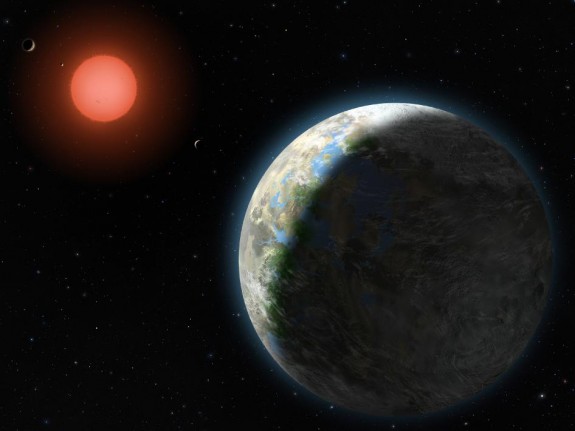No, You Can’t Officially Rename a Planet. But No One Can Stop You From Trying
This contest to name exoplanets isn’t official. But does that really matter?

An artist’s rendition of Gliese 581 g, a potentially habitable exoplanet with a decidedly boring name. Photo: NASA / Lynette Cook
The Kepler spacecraft is hunting down planets outside our solar system at a rapid clip. The total number of confirmed exoplanets is now at a whopping 861 and there are 2,903 more potential exoplanet candidates waiting in the wings. Space, it seems, is less of an empty void with each passing day.
The pace of discovery and the uncertainty in each finding—with exoplanets first being considered “candidates” before moving to full-fledged “discovered” status with subsequent observations—means that exoplanets are often given unwieldy placeholder names. Gliese 667Cc, for example, is the second planet around the third star in the Gliese 667 system. Gliese 581 g is the 6th planet around the star Gliese 581. But as useful as these names are for astronomers—more road map than moniker—they don’t exactly roll off the tongue.
A new organization—Uwingu–wants to fix this little dilemma. They’re offering a platform for you to suggest and vote on new planetary names. Their general goal is not to assign a specific name to a specific planet, but rather to tabulate a ready-made list from which astronomers can draw. They did, however, recently launch a contest to rename the planet Alpha Centauri Bb, the closest exoplanet to Earth. Drawing a wary eye from some, Uwingu wants you to back your votes with cash: one dollar, one vote.
Uwingu’s project to give exoplanets new names has drawn the ire of another group – the people who actually name exoplanets. The International Astronomical Union, says the CBC, wants to remind everyone that only they have the power to officially name extraplanetary bodies. Even if your exoplanet name of choice wins Uwingu’s contest, they say, it will have “no bearing on the official naming process.” Uwingu points out, however, that while the International Astronomical Union controls planets’ official names, they have no control over their common names. And, just because a name isn’t official doesn’t mean people won’t use it.
Back in October, The Weather Channel tried a similar trick when they unilaterally decided to start giving names to winter storms without first talking to the World Meteorological Organization or other large meteorological bodies. If you remember Winter Storm Nemo, thank The Weather Channel.
So while it may be true that you can’t vote your way to an official new planet name, the CBC adds that for many celestial objects their unofficial common name (say, the North Star) is used by many in place of the official name (Alpha Ursa minori).
Besides, says Phil Plait for his blog Bad Astronomy, the money being raised is going toward real science. Uwingu “will use the profits to fund scientific research. People will be able to submit proposals for the funding, which will be peer reviewed to ensure high-quality work. And it’s not just research: they hope to fund space-based projects, education, and other science-supporting ventures.”
Indeed, says Plait, even though only the IAU can make planet names official, the names on Uwingu’s list “will be seen by planetary astronomers, and eventually those planets are going to need names. Why not yours?”
More from Smithsonian.com:
Dennis Hope Thinks He Owns the Moon
What the Discovery of Hundreds of New Planets Means for Astronomy—and Philosophy
What if All 2,299 Exoplanets Orbited One Star?
/https://tf-cmsv2-smithsonianmag-media.s3.amazonaws.com/accounts/headshot/smartnews-colin-schultz-240.jpg)
/https://tf-cmsv2-smithsonianmag-media.s3.amazonaws.com/accounts/headshot/smartnews-colin-schultz-240.jpg)